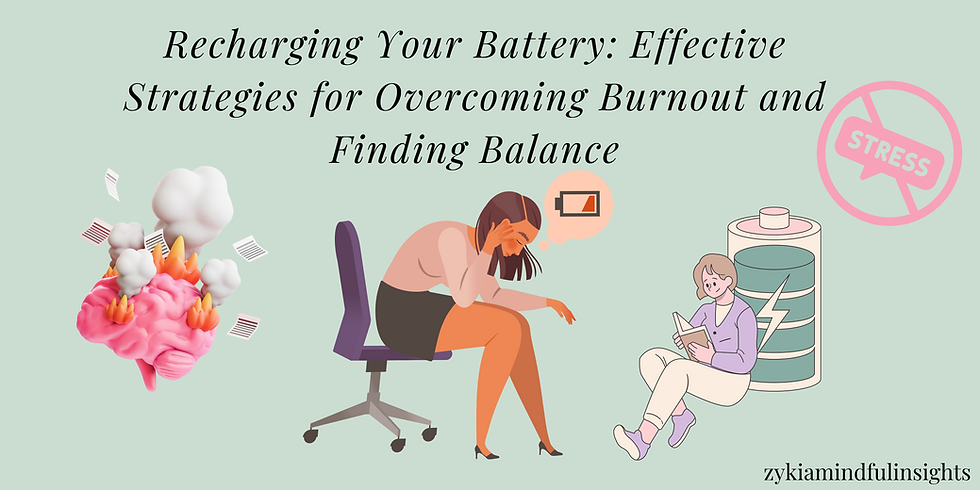Exploring the Impact of Seasonal Allergies on Mental Health: What You Need to Know
- Zykia Hannah

- Feb 22, 2024
- 4 min read
As we all know that allergy season is right around the corner. I decided to talk about this because it's a lot of people that deal with really bad allergies. I hope you enjoy today's post.
Emerging research highlights a potential link between allergens and mood disorders, such as depression and anxiety. Being aware of this connection is crucial, and seeking support from healthcare professionals, such as allergists or mental health specialists, can help in managing both the physical and emotional aspects of allergies and mood disorders. It's important to stay informed and proactive in addressing these issues for better overall well-being.

Seasonal allergies can significantly impact mental health by causing discomfort and distress, leading to increased stress, anxiety, and even depression. The constant sneezing, itching, congestion, and fatigue can affect one's ability to concentrate and engage in activities, which may lead to feelings of frustration, irritability, and hopelessness.
Furthermore, the continuous allergy symptoms can disrupt sleep patterns, leading to fatigue and poor sleep quality. This, in turn, can exacerbate symptoms of depression and anxiety.
Moreover, people with allergies may experience social isolation or a reduced quality of life due to their symptoms, which can also negatively impact mental health.
It's important to manage allergies effectively through medication, lifestyle changes, and allergen avoidance to minimize the impact on mental health. Seeking support from healthcare professionals, such as allergists or therapists, can also be beneficial in managing both the physical and emotional aspects of allergies.
Why would allergies contribute to mood disorders?
Allergies can be a drain on our overall health. They disrupt our sleep, diminish our energy levels, dull our sense of smell, cloud our mental sharpness, and hinder our productivity. These effects can take a toll on our mental well-being.
Here are 4 Tips to help Manage your Allergy Symptoms
Plan time outdoors wisely. Avoid spending time outdoors during the early morning and mid-morning hours, when pollen counts are usually at their highest. Opt for outdoor activities later in the evening when pollen levels are lower. On hot, dry, windy days, pollen can be particularly prevalent. Stay indoors if possible, or take extra precautions when going outside. Consider wearing a face mask when spending time outdoors to reduce the amount of pollen you inhale.
Give your sinuses a bath. Another proven method to alleviate allergy symptoms is nasal irrigation. This involves using a neti pot or bulb syringe to gently pour a saline solution into one nostril, allowing it to drain out of the other. Nasal irrigation helps reduce congestion and may decrease your reliance on medication.
Reduce pollen at home. When coming indoors from the outside, remove your shoes and change your clothes to avoid tracking pollen inside. Showering can also help remove any lingering pollen from your skin and hair. Encase your mattress and pillows in hypoallergenic covers to prevent pollen from settling on them. Washing your bedding in hot, soapy water can further help remove pollen and other allergens.
Find medication that works for you. Finding the most effective allergy medication regimen might require some experimentation. Discuss with your healthcare provider to devise a personalized plan. Nasal steroid sprays are commonly used initially, while antihistamines and decongestants can provide immediate relief. For a more lasting solution, explore allergy immunotherapy.
Common allergy symptoms may include:
Itchiness in the eyes
Sneezing, sniffing, and coughing
Hives, which form a raised rash
Heavy breathing through the mouth
Wheezing and shortness of breath
Headaches
Coughing
Severe symptoms may also include:
Ear pain and ear infections
Nose bleeding
Gastrointestinal issues
While allergies are prevalent, diagnosing them can be challenging due to symptom overlap with other conditions. Although a specific cure doesn't exist, treatment options can effectively manage symptoms.
"The impact of seasonal allergies on mental health is often overlooked. The constant discomfort and fatigue can lead to increased stress, anxiety, and even depression, affecting your overall well-being."
How your Mental Health can be Affected by Seasonal Allergies?
Seasonal allergies can have a significant impact on mental health. Here are a few ways in which they can affect your mental well-being:
Stress: The constant discomfort, fatigue, and irritability caused by allergies can increase stress levels. This stress can be particularly challenging for individuals who have pre-existing anxiety or mood disorders.
Anxiety: Seasonal allergies can exacerbate anxiety symptoms. The physical discomfort and unpredictability of allergic reactions can contribute to feelings of unease and worry.
Depression: Allergies can also worsen depressive symptoms. The chronic nature of allergies, coupled with their effect on sleep and overall quality of life, can contribute to feelings of hopelessness and sadness.
Social Isolation: Individuals with seasonal allergies may also experience social isolation or reduced participation in activities due to their symptoms. This can negatively impact mental well-being by increasing feelings of loneliness and disconnection from others.
Poor Sleep Quality: Allergies can disrupt sleep patterns, leading to fatigue and reduced mental alertness. Poor sleep quality can exacerbate symptoms of anxiety and depression.
It's essential to address seasonal allergies effectively through medication, lifestyles changes, and allergen avoidance to minimize their impact on mental health. Seeking support from healthcare professionals, such as allergists or therapists, can also be beneficial in managing both the physical and emotional aspects of allergies.
In conclusion, seasonal allergies can have a profound impact on mental health, affecting stress levels, mood, social interactions, and overall well-being. Managing allergies effectively through medication, allergen avoidance, and lifestyle changes is essential to minimize their impact on mental health. Seeking support from healthcare professionals, such as allergists or therapists, can also be beneficial in managing both the physical and emotional aspects of allergies. It's crucial to stay informed, proactive, and seek assistance when needed for better overall mental and physical well-being.
🤍Quote of the day:
"There is no path to happiness: happiness is the path." - Buddha




Comentarios